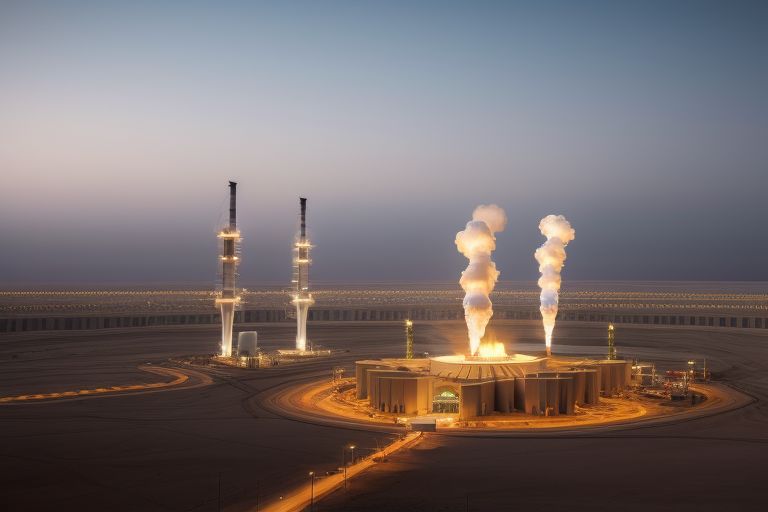The Importance of Natural Gas to Saudi Arabia’s Economy
Introduction to Saudi Arabian Natural Gas
Saudi Arabia, known primarily for its vast oil reserves, also plays a crucial role in the global energy market as a significant producer of natural gas. Natural gas, which is used for electricity generation, heating, and as an industrial fuel, is an essential part of the world’s energy mix. Saudi Arabia, although more famous for its oil, has made significant strides in utilizing and exporting natural gas to meet both domestic and global demand. The country’s strategic investments in gas exploration and production have cemented its position as one of the world’s leading natural gas producers.
Saudi Arabia’s Natural Gas Reserves
Saudi Arabia is home to some of the largest natural gas reserves in the world, with substantial untapped resources. According to estimates, the Kingdom has over 8 trillion cubic meters of natural gas reserves. Much of these reserves are found in the southern and eastern parts of the country. In recent years, Saudi Arabia has focused on unlocking these reserves and developing them to meet its growing domestic needs and increase its export capacity. As the global demand for natural gas continues to rise, Saudi Arabia’s significant reserves position it as a key player in the global energy market.
The Importance of Natural Gas to Saudi Arabia’s Economy
Natural gas is becoming an increasingly vital part of Saudi Arabia’s economy. While oil still dominates the country’s energy sector, natural gas is seen as a cleaner and more sustainable alternative to oil in many applications. As the demand for cleaner energy sources grows globally, Saudi Arabia has turned to natural gas to diversify its energy mix. The use of natural gas for domestic electricity generation, desalination plants, and industrial purposes has reduced the Kingdom’s reliance on oil for local consumption, allowing more crude oil to be exported. Additionally, natural gas is seen as an important fuel for the Kingdom’s industrial growth, with major petrochemical projects being powered by natural gas.
Natural Gas in Power Generation and Industry
Saudi Arabia uses natural gas extensively for power generation and as a fuel source for its industrial sector. The country has invested heavily in gas-fired power plants, which provide electricity to meet the needs of its rapidly growing population. Additionally, natural gas is a critical feedstock for the Kingdom’s petrochemical industry, which is one of the largest in the world. The petrochemical sector relies on natural gas for the production of fertilizers, plastics, and other essential materials. As a result, natural gas not only powers homes and businesses but also fuels the country’s key industries, driving its economic development.
Export of Saudi Arabian Natural Gas
While Saudi Arabia has traditionally been a major exporter of oil, its natural gas exports are also growing. The Kingdom has invested in infrastructure such as liquefied natural gas (LNG) terminals and pipelines to export natural gas to global markets. Saudi Arabia’s natural gas exports are particularly important in regions such as Asia and Europe, where the demand for cleaner energy alternatives to coal and oil is on the rise. The ability to provide a stable and reliable supply of natural gas strengthens Saudi Arabia’s position as a key global energy supplier.
Environmental Impact and Future Trends
As the world increasingly focuses on reducing carbon emissions and combating climate change, natural gas has been positioned as a cleaner alternative to coal and oil. Saudi Arabia has taken steps to ensure that its natural gas production aligns with environmental goals, investing in technologies to reduce methane emissions and enhance the efficiency of its gas infrastructure. Furthermore, the Kingdom has ambitious plans to integrate renewable energy into its power generation mix, including solar and wind power, while continuing to expand its natural gas capabilities. This dual strategy of traditional and renewable energy development is part of Saudi Arabia’s Vision 2030 plan, which aims to diversify the Kingdom’s economy and energy portfolio.
The Role of Natural Gas in Saudi Arabia’s Vision 2030
Saudi Arabia’s Vision 2030 plan is a roadmap for the country’s future development, and natural gas plays a key role in this strategy. The Kingdom aims to reduce its reliance on oil and foster a more diversified and sustainable energy landscape. As part of this vision, Saudi Arabia plans to increase its natural gas production to meet domestic needs and expand its export markets. The Kingdom is also focusing on utilizing natural gas to fuel clean energy technologies, which aligns with global trends toward reducing carbon emissions and achieving energy security.
Conclusion
Saudi Arabian natural gas is becoming an increasingly vital resource in both the Kingdom’s domestic energy sector and its position as a global energy supplier. With vast reserves, modern infrastructure, and strategic investments in both production and export capacity, Saudi Arabia continues to be a key player in the global natural gas market. As the world moves toward cleaner energy solutions, Saudi Arabia’s natural gas resources will remain crucial in meeting global energy demands while helping the Kingdom diversify its economy. The country’s efforts to integrate renewable energy sources alongside natural gas production will shape its energy future for years to come.
For those interested in traveling to Saudi Arabia, ensure you understand the SAUDI VISA DOCUMENT REQUIREMENTS and find out more about the SAUDI ARABIA VISA FOR CHILDREN to make the application process smoother.














Post Comment